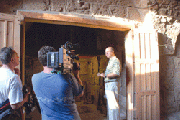For first-time visitors to the Middle East, the experience screams “exotic,” even from forty thousand feet overhead. From the window of a Beirut-bound MEA twinjet, wreaths of mystery smoke creep upward from fires in Turkish Capadocia, the bronze needle of Cypress shines in the Mediterranean and the green fields of the Bekaa sprawl toward Syria.
These are magical lands that many Westerners have marveled over in adventure stories and history primers, but few ever really hoped to visit.
That changed for executive producer Keith Famie and the Detroit-based film crew of Visionalist Entertainment Productions when a September trip to Lebanon and Jordan capped the visual and cultural core of “Our Arab American Story,” a film about Detroit’s burgeoning Arab community. It’s chapter four in Famie’s “Our Story” documentary series, which includes last year’s triple-Emmy winning “Our Italian Story.” It will air on WXYZ on December 15, at 7 p.m.
Famie, a former celebrity chef, is best known for his role on “Survivor II” and for his Food Network cooking series, “Keith Famie’s Adventures,” which Visionalist produced.
Along with cinematographer Kevin Hewitt and writer Chris Kassel—a skeleton crew compared with the usual Visionalist entourage—Famie traveled first to Beirut with Lebanese native Dr. Marwan Abouljoud, director of the Henry Ford Hospital Transplant Institute and one of the world’s most highly-regarded transplant surgeons. Dr. Abouljoud’s mission was to visit his ailing father, Mustapha, 87, who is suffering from a degenerative heart condition and who stubbornly holds on to his Beirut address though all seven of his children have, at one time or another, sought opportunity outside Lebanon. The trip was a poignant culmination to Dr. Abouljoud’s interview for “Our Arab American Story,”’ in which he speaks with passion about his parents and his Islamic upbringing.

|
| Dr. Marwan Abouljoud giving his dad a kiss while visiting him in Lebanon |
Ramadan observances made the souks and cafés of Beirut a visual mezze for the filmmakers, and even the recent assassination of MP Antoine Ghanem in the Sin al-Fil suburb, an event which threw much of the city into ersatz martial law, did not keep the determined crew from showcasing Beirut in its venerated, ninth-month splendor.
Producer Famie says, “We were fortunate to have Salem Beydoun (board member, National Council for Tourism in Lebanon) as our guide. American Arab Chamber of Commerce (AACC) leader Nasser Beydoun put us in touch with Salem, who knows Beirut like the back of his hand, and in the midst of all the turmoil and his own family obligations, he kept us safe and let us know what we could and could not film. It’s obvious how well respected he is in Beirut—I can’t imagine how we could have succeeded without him.”
From Lebanon, the Visionalist crew flew to Amman, Jordan, the hometown of Dr. Haifa Fakhouri, President and CEO of the Arab American and Chaldean Council (ACC). Unable to accompany Famie and company due to her hectic Detroit schedule, Fakhouri nonetheless helped facilitate can’t-miss trips to Petra, the Dead Sea and the recently-authenticated site of Jesus’ baptism, all of which will ultimately bear her vivid, voice-over descriptions when “Our Arab American Story” passes through its editing stage. “As in any video production,” Famie points out, “editing is where the true art happens.”
A third destination, Yemen, had to be scrapped at the last minute because of snafus with the bogglingly complex series of permits and visas required to get a camera crew with a full complement of equipment into the country. Even travel agent Ginny Fakhouri could not jump through enough hoops to assure a smooth pathway through customs, nor could the Yemen embassy in Detroit pull the right strings quickly enough to make it happen. This was a regrettable and unforeseen glitch in Famie’s program, since his goal in Yemen was to follow Detroit businessman Rick Abdullah back to the small village outside Taiz where his parents were spending Ramadan.
“We’ll use digital shots that Rick will provide when he gets back, sort of a ‘family album’ format for that segment. We’ll make it work. In filmmaking, like football, we’re used to punting at times like these.”
Despite the ups and downs, endemic to most such trips, Famie left the Middle East with a tremendous respect for the resilience and dignity of the Arab people, along with a fresh appreciation for the width and breadth of their contributions to world culture.
“One constant that I’ve heard in interviewing literally dozens of Arab Americans throughout Detroit is how proud they are of their heritage and history—how gratified they are to be Arab. Now that I’ve been there, I totally understand it: I would be, too.”






Leave a Reply